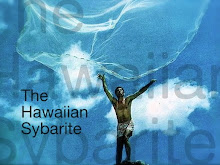
For those of you in Hawaiʻi, we hope that you enjoy the festivities. For everyone, in Hawaiʻi and elsewhere, we hope that you will first consider and then judge, with something as close to critical objectivity as possible, the events in the Kingdom over the last two centuries.
In the generation preceding Kamehameha, Kahekilinuiʻahumanu of Maui (Kahekili II) united all Hawaiian Islands, with the notable exception of the Island of Hawaiʻi, for the first time. Kamehameha, born with the heralding of a comet in the Kohala district on the island of Hawaiʻi in 1758 (or maybe 1737) managed to first unite the islands and then deftly navigate the treacherous malstrøm of competing colonial powers, while also promulgating the Māmalahoe Kānāwai, an acknowledged ancestor of today's Universal Declaration of Human Rights.
That's the popular story, and it may be true. But a different, complementary history of Kamehameha I also exists: Kamehameha I, the beginning of the end.
In contrast to Kahekili II, Kamehameha I enthusiastically engaged the European powers, in particular Great Britain, and in 1794 he asked Great Britain to establish a protectorate over the Island of Hawaiʻi in exchange for a warship to fight Kahekili II. To many Hawaiians and their supporters, the subsequent history has been little more than a series of disappointments and catastrophes.
In Aotearoa New Zealand, the Māori met Europeans with warfare, and have retained a measure of their land, culture and dignity. In Hawaiʻi, Kamehameha I met Europeans with the Aloha spirit, and Hawaiians have been denigrated ever since. Kamehameha drew Europeans into his court, married them to local noblewomen, and appointed them as governors of islands—the Welsh sailor Isaac Davis as governor of Oʻahu and the Englishman, John Young, as governor of the Island of Hawaiʻi.
More Europeans came, then Americans, then Calvinist missionaries. By 1890, U.S. minister to Hawaiʻi John Stevens was able to happily inform U.S. Secretary of State James Blaine that "the native population of 60 years ago is reduced less than one-third … and it is continually growing less." Stevens could barely control his excitement as he reported that "just one-half of the total population is of the original Hawaiian race," with only "a small proportion of the lands and other properties and in their possession."
In 1892, John Stevens, still in his official capacity, wrote to newly-appointed U.S. Secretary of State John Forster that "The value of the Hawaiian Islands to the United States for commercial and naval purposes has been well understood by American statesmen for more than half a century. To postpone American action many years is only to add to present unfavorable tenencies and to make future possession more difficult." Stevens concludes his letter with his command: "Americanize the islands, assume control of the 'crown lands.'"
It's all very sensible—from the American perspective, and only when the American public has been properly trained in doublethink, so that they are able to destroy one nation while simultaneously lauding their own democratic humanism and perceive no ethical contradiction therein.
In Stevens' letters, the opinions of Hawaiians about their own country are absent, but it wasn't especially important what Hawaiians thought. Nor was it important what the growing Asian population thought; That was made explicit.
"There are such a large number of Chinese and other cheap laborers on the islands who cannot be trusted to vote intelligently," Charles L. Carter, a member of the Hawaiʻi Provisional Government's Annexation Committee, told the New York World, "that if universal suffrage was declared the whites who represent almost the entire business interest of the country, would be outvoted and powerless."
This subversion of democracy and passionate opposition to basic human rights continued through the twentieth-century. Hawaiʻi's 1959 Admission Act plebiscite was conducted in brazen disregard of the United Nations charter, and therefore both U.S. and International Law. It is an impressive achievement of the United States' intellectual class that the Admission Act and Hawaiʻi's status as 50th state—both cynical frauds—are the subject of almost no critical media debate. The American propagandists' counterparts in Beijing or Moscow are no doubt envious that they can't have such an easy job in silencing dissent and liquidating their conquered neighbors.
The United States' commissars have done their jobs so well that next month, we in Hawaiʻi will be encouraged to take part in the utterly grotesque exercise of celebrating the independence of the uninvited messianic colonizer that destroyed our own independence, and in fact continues its mission to destroy what's left of our country.
Few things are truly intractable, and the case of Hawaiʻi v. The United States of America is actually a simple one, since nearly all facts are uncontested by both sides. For today, Hawaiʻi will, in the words of Francine du Plessix Gray, "remain profoundly hedonistic and provincial, a sugar-coated fortress, an autistic Eden, a plastic paradise in which the militarism and racism of the American empire are cloaked by a deceptive veil of sunshine and of flowers."


No comments:
Post a Comment